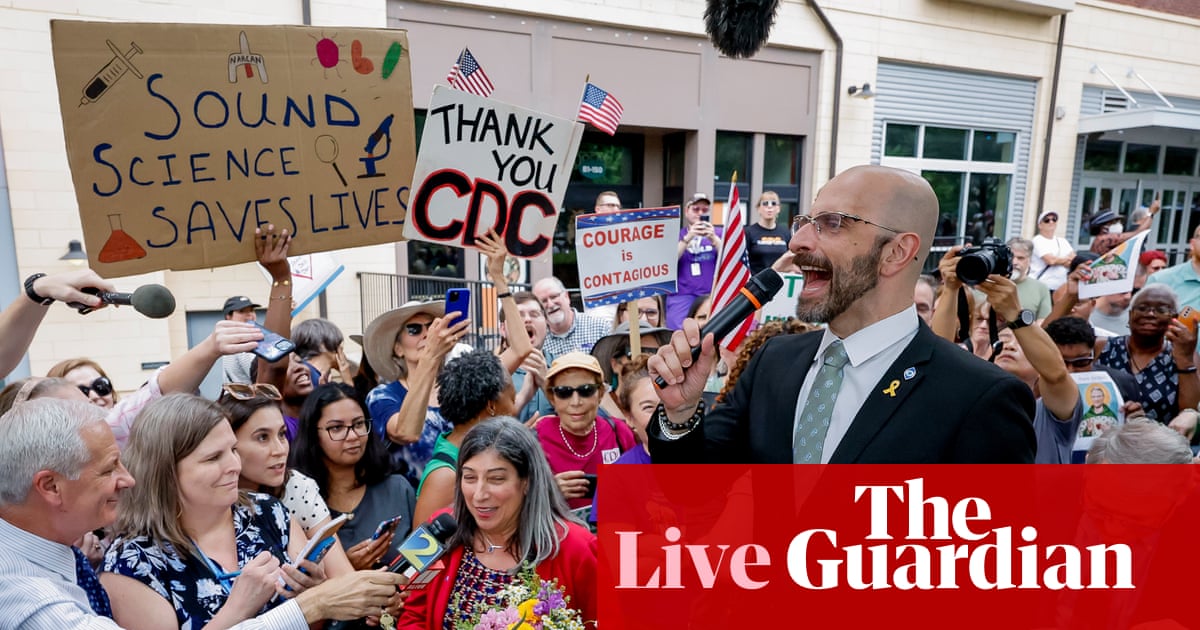On the campaign trail, Donald Trump vowed that his administration would release a tranche of documents in the criminal investigation into disgraced late financier Jeffrey Epstein.
But since Trump returned to the White House, his promises have fallen flat, with few documents released – and backtracking about releasing more records. The lack of disclosure has prompted not only dissatisfaction among those seeking information about Epstein’s crimes, but political flak Trump can’t seem to deflect, especially about his own relations with the convicted sex trafficker.
But where political pressures have so far failed, legal pressures that have largely sailed under the radar of the fierce debate about Epstein’s crimes could yet succeed and bring crucial information in the public eye.
Several court cases provide some hope that even if Trump’s justice department fails to make good on calls for transparency, potentially revelatory records about Epstein, his crimes and his links to some of the most powerful people in the US might still see the light of day.
Moreover, it is possible that the justice department’s unusual request to unseal grand jury transcripts, in Epstein and accomplice Ghislaine Maxwell’s criminal cases, could also undermine opposition to it releasing records.
One lawsuit brought by the news website Radar Online and investigative journalist James Robertson stems from their April 2017 public records request for documents related to the FBI’s investigation of Epstein. This request came years after Epstein pleaded guilty to state-level crimes in Florida for soliciting a minor for prostitution – and before his 2019 arrest on child sex-trafficking charges in New York federal court.
Radar and Robertson filed suit in May 2017 after the FBI did not respond to their request; the agency ultimately agreed that it would process documents at a rate of 500 pages per month, per court documents.
“Despite the FBI identifying at least 11,571 pages of responsive documents, 10,107 of those pages remain withheld nearly 20 years after the events at issue,” according to court papers filed by Radar and Robertson.
Although Epstein killed himself in custody awaiting trial, and Maxwell is serving a 20-year prison sentence, the FBI is fighting release of more documents. The agency has invoked an exception to public records disclosure that allow for documents to be withheld if their release would interfere with law enforcement proceedings.
The Manhattan federal court judge overseeing this public records suit sided with the FBI’s citation of these exemptions, but Radar is pursuing an appeal that could be heard in the second circuit court of appeals this fall.
“In court, they insist that releasing even one additional page from the Epstein file would hurt their ability to re-prosecute Ghislaine Maxwell in the event the supreme court orders a new trial,” a spokesperson for Radar said.
“It’s a flimsy rationale and we are challenging it head on in the court of appeals. Our only hope of understanding how the FBI failed to hold Epstein accountable for over a decade – and preventing future miscarriages of justice – is if the government releases the files.”
It’s also possible that the justice department’s request to release grand jury transcripts in Epstein and Maxwell’s cases could bolster arguments for the release of records.
“The DoJ’s core argument against disclosure for the past six years has been that it would jeopardize their ability to put – and keep – Ghislaine Maxwell in prison. They say that releasing even a single page could threaten their case,” the Radar spokesperson said. “Naturally, any support they offer to release material undermines their claims.”
Separately, developments in civil litigation involving Epstein and Maxwell could also potentially lead to the disclosure of more documents surrounding their crimes.
A federal judge in 2024 unsealed a cache of documents in the late Epstein accuser Virginia Giuffre Roberts’s defamation case against Maxwell. Some documents were kept under seal, however, and journalists pursuing release of documents appealed against that decision.
On 23 July, the second circuit decided that it found “no error in the district court’s decisions not to unseal or make public many of the documents at issue”, but it also ordered the lower court to review possibly unsealing them.
Robert’s attorney Sigrid McCawley reportedly said she was “thrilled with the decision” and also said she was “hopeful that this order leads to the release of more information about Epstein’s monstrous sex trafficking operation and those who facilitated it and participated in it”, according to Courthouse News Service.
Others who have represented Epstein victims have called for disclosure of public records – and voiced frustration about being stonewalled in their pursuit of documents.
Jennifer Freeman, special counsel at Marsh Law Firm, who represents Epstein accuser Maria Farmer, previously told the Guardian she had made a public records request for information related to her client, with no success.
Spencer T Kuvin, chief legal officer of GoldLaw and an attorney for several Epstein victims, hopes that public records battles could help pull back the veil on Epstein information.
“I think that the Foia requests will absolutely assist in the disclosure of information. The DoJ has made blanket objections citing ongoing investigations, but through Foia litigation the courts can test those objections by potentially reviewing the information ‘in camera’,” Kuvin said. “This means that an independent judge may be appointed to review the information to determine whether the DoJ’s objections are accurate or just a cover.”
Roy Gutterman, director of the Newhouse School’s Tully Center for Free Speech at Syracuse University, cautioned that calls for disclosures – and even government requests to release some files – might not be a panacea for access to extensive documents.
“This case is already complicated, and there were already too many cooks in the very crowded kitchen, and it’s getting more crowded as more public interest grows in the grand jury materials as well as the now-settled defamation case,” Gutterman said.
But stonewalling could also continue. With the public records requests, it’s possible that US federal authorities could still successfully cite the investigation exemption and keep documents out of pubic view.
“Using Foia for FBI and law enforcement materials related to this case, might be a creative newsgathering tactic, but the law enforcement exemption the government is citing might be legitimate because some of the materials are grand jury materials and some other materials might include private or unsubstantiated allegations,” Gutterman said.
“The reporter in me thinks there is an important public interest in revealing these documents, but the law might end up keeping most material secret. Even with the widespread and growing public interest, it might be too big an ask to unseal a lot of this material.
“Practically speaking, the DoJ might also be very selective in which materials it would want to release as well because of the political element involved here, too.”

 German (DE)
German (DE)  English (US)
English (US)  Spanish (ES)
Spanish (ES)  French (FR)
French (FR)  Hindi (IN)
Hindi (IN)  Italian (IT)
Italian (IT)  Russian (RU)
Russian (RU)  3 weeks ago
3 weeks ago
























Comments